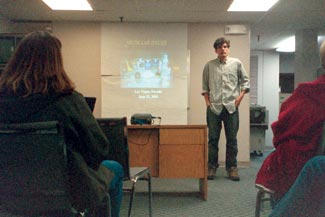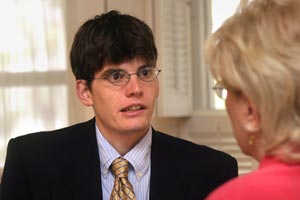
| Internships Increase Confidence, Skills Outside the Classroom | |
| By Leslie Weddell |
Marissa O’Neil ’04 and Tim Sheehan ’06 credit their internships with making a crucial difference in their career paths.
 |
| Tim Sheehan ’06 introduces Detective Terry Curry to a group of Court-Appointed Special Advocates (CASA), the organization for which he interned. Sheehan arranged for Curry, an undercover narcotics detective, to teach CASA volunteers to identify possible methamphetamine labs in homes they visit while preparing to advocate for children caught up in the court system. Sheehan organized the seminar after surveying CASA volunteers and learning they wanted to know about the effects and signs of methamphetamine use and manufacture. |
O’Neil combined her interests in athletics and the human body to create her own major, biomechanics/studies in human performance. After graduation, O’Neil weighed six job offers, including becoming the strength and conditioning coach for an NFL player, managing a training facility, and training high-school athletes. She opted for a strength and conditioning coach position at La Palestra, a private athletic training and education center for corporate executives and celebrities in New York City, because it offered her the widest range of learning opportunities.
O’Neil doubts she would have been considered without her three internships in the strength and conditioning field, which provided practical applications of the theory and science she learned at CC.
In 2003, while many classmates spent their junior years abroad, O’Neil headed to Tempe, Ariz., where she interned at Athletes’ Performance, a training facility for professional athletes. “I was a sponge,” she says. “I watched and observed everything, and asked ‘why, why, why’ all the time.”
The previous year, O’Neil interned at Body by Boyle in Winchester, Mass., where she trained athletes and corporate executives and created rehabilitation programs. In 2000, she worked at College of the Holy Cross in Worcester, Mass., implementing strength and conditioning programs for 11- to 31-year-olds. “Everything I’ve learned in my internships directly translates to what I do in my job,” O’Neil says.
Tim Sheehan, a sociology and psychology major, calls his internship “the most rewarding experience of my life.” Sheehan, who served as the assistant to the director of volunteers at CASA (Court Appointed Special Advocates) in Colorado Springs, continues to volunteer for the nonprofit child advocacy center, although the internship has concluded. “I loved working there,” he says. “What I gave to them, I’ve gotten back three times over.”
 |
| As part of its effort to introduce students to careers in the nonprofit arena, CC’s Civic Engagement Fellowship Program teamed with CASA to provide a full-time, summer-long paid internship to Tim Sheehan ’06. Here, Internship Coordinator Judy Offerdahl talks with Sheehan about his experience. |
Sheehan’s first mission was to create, administer, and tabulate a survey of the organization’s volunteers. His duties soon expanded to working as a facilitator for noncustodial parents during supervised visiting time, accompanying advocates and case supervisors to court hearings for children, inventorying archival case information, and organizing a seminar for CASA volunteers on methamphetamines, a project that stemmed from the survey results.
Sheehan says his summer internship built his confidence and helped narrow his career path to two fields: law and counseling. “Regardless of what I do, the experience was invaluable,” he says. “Right now, I feel I can go anywhere I want to.”
The Colorado College | 14 East Cache La Poudre Street | Colo Sprgs, CO | 80903 || 719-389-6000